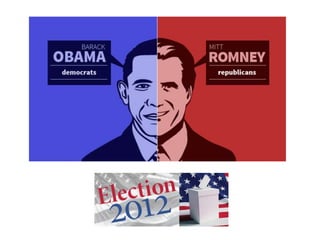
U.s. election 2012
- 2. Notable Presidents War on: he gets going Oh Man! Brain call Hot oversteered loo George Washington Abraham Lincoln Theodore Roosevelt Finest love-lorn dark Jail limit 'n' clown He grew bogus In Marx in chord Franklin D Roosevelt William J Clinton George W Bush Richard M Nixon
- 3. How does the Electoral College work? • Voters in the US go to the polls in their states (there are 50) • There are 538 ‘electors’ who will decide the election. A candidate needs support of 270 electors to win the presidency • Each state has the same number of electors as members in its congressional delegation. Texas has 38 electors total, equal to its 36 members in the House and 2 Senators. • California has the most with 55. Texas has the second most. 3 is the smallest number of electors for any state. • Most states have a winner-takes-all rule • So even if a candidate wins just 50.1 percent of the popular vote in a state, they win all of the electoral votes in that state. The exceptions to the winner-takes-all rule are Maine and Nebraska. • The totals are added up – and a winner is decided on Wednesday morning...usually!
- 5. • First presidential election • There was not universal suffrage as we know it today – only 6% of population could vote • • Electors had two votes • Three states did not vote for various reasons • • In the early years the runner up became Vice President
- 6. • Electoral college landslide – Nixon takes 48 states • A ‘faithless voter’ in Virginia votes for John Hospers • California becomes most populous state and therefore has most electors for the first time overtaking NY • 18 year olds can vote for the first time (26th Amendment) • • Nixon resigned two years later after the Watergate • scandal •
- 7. • What seems like a straightforward win for Clinton is masked by the performance of a third party ‘spoiler’ candidate • Although Ross Perot gained no electoral college votes, he did pick up over 19 million of the popular vote • • As Perot was a right wing candidate it could be argued that if he hadn’t have stood George H Bush may have won a 2nd term • •
- 8. • Bush wins presidency despite Gore gaining 500,000 more votes nationwide • The election comes down to Florida’s 25 electoral college votes, with Bush winning the state by just 500 votes • Problems with voting machines in some areas leads to court challenges by • Gore – the Supreme Court finally deciding to end manual recounts by 5-4 • • Again a third party ‘spoiler’ has an impact – environmentalist Ralph Nader. If he had not have stood it is likely Gore would have won the election
- 9. • Obama received more votes than any candidate in history – almost 70 million • McCain won Nebraska but Obama took one Electoral • College vote – the first time it had done this since • changing system in 1992 • 2000 Election stolen?
- 10. Battleground states • Most states have a history of voting for a particular party and the presidential candidates will count on their votes again. This leaves a handful of states where the election will be decided. These are the election battlegrounds. • In these states the race is close enough that either candidate could win. These "purple states" are where the campaigns will focus their time and money.
- 11. There are Congressional elections today too!
- 12. House of Representatives • Each state elects Representatives based on their population • California elects • All 435 House members are up for re-election most in 2012 Representatives • The House is not expected to change - 53, Alaska hands, though either party could make gains elects 1 depending on the results of the 20 ‘toss-up’ districts • The Republicans • Missouri 2nd district pitches Todd Akin (R) currently have a against Claire McCaskill (D) after his clear majority in controversial ‘legitimate rape’ comments. The the House (242- race has narrowed but Akin is still expected to 193) win
- 13. Senate • Each state elects 2 Senators regardless of population size • The Democrats currently have a • 1/3 (33) of Senate is up for re- slim majority in the Senate (51-47) election in 2012 • Well short of a • The Senate is not expected to ‘filibuster’ proof change hands, though there could total of 60 be a tie if all 4 of the ‘toss-up’ races • The 2 go to the Republican candidates ‘Independents’ (Montana, ND, Wisconsin and both caucus with Virginia) the Democrats
- 14. There are also Gubernatorial Elections in 11 states... • Including West Virginia, North Carolina and Utah ...and also initiatives! • There are 174 propositions on 37 state ballots on issues ranging from: • Legalising marijuana (Colorado, Oregon & Washington) • Same-sex marriage (Maine, Washington & Maryland) • Health care (Alabama, Florida, Montana & Wyoming) • And more including death penalty & taxes...
- 15. The first polls close at Midnight... • 0:00 am (6): Georgia, Indiana, Kentucky, South Carolina, Vermont, Virginia • 0:30 am (3): North Carolina, Ohio, West Virginia • 1:00 am (16): Alabama, Connecticut, Delaware, DC, Florida, Illinois, Maine, Marylan d, Massachusetts, Mississippi, Missouri, New Hampshire, New Jersey, Oklahoma, Pennsylvania, Rhode Island, Tennessee • 1:30 am (1): Arkansas • 2:00 am (14): Arizona, Colorado, Kansas, Louisiana, Michigan, Minnesota, Nebraska, New Mexico, New York, North Dakota, South Dakota, Texas, Wisconsin, Wyoming • 3:00 am (4): Iowa, Montana, Nevada, Utah • 4:00 am (5): California, Hawaii, Idaho, Oregon, Washington So6:00am (1): Alaska after college and set your alarm for • straight to bed 11...and don’t forget the bingo sheet!